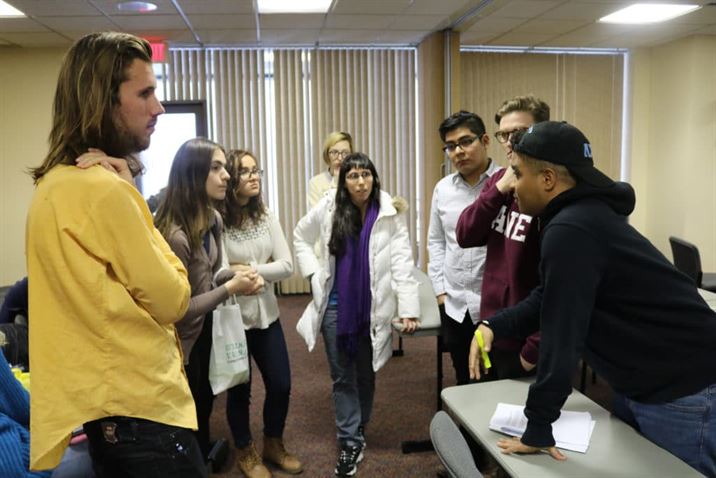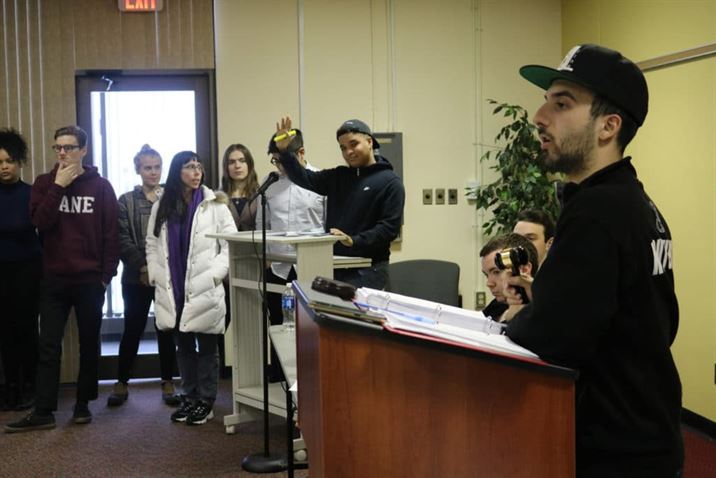
Students gather around legislator Wellington Gomez after quorum was called following Wednesday’s meeting.
Photo Credit: Gabe Wanissian
A bill to survey undergraduates pertaining to Montclair State University becoming a sanctuary campus was finally passed Wednesday night after a hotly-contested Student Government Association (SGA) meeting. The bill came into existence after the original bill to have SGA endorse sanctuary campus policy was opposed, due to legislators claiming they did not have enough information on how sanctuary campuses would protect the rights of undocumented immigrants.
However, information regarding the pros and cons of sanctuary campus policy was sent out to all legislators over a month ago, after the initiative was originally brought up by student activists at the February 6 SGA student affairs meeting.
“People voted no because they didn’t do their research [on the policies],” said SGA legislator Wellington Gomez, who authored the original bill. Gomez added that the executive board needs to hold legislators more accountable to being informed for their jobs. “It is disappointing because this is a human rights issue that we are taking on right now.”
“We are trying to advertise initiatives more, and do things like on-campus voting booths to educate students more, and to go out there and speak to students directly,” said SGA President Matthew Lerman. There is no timetable as to when such actions will take place.
A college or university that adopts sanctuary campus policies may refuse to cooperate with federal officials who seek to deport undocumented students by utilizing its autonomy as an educational institution, and to bolster protection for students protected under the Deferred Action for Childhood Arrivals (DACA) or “Dream Act” program.
The bill opposition also stemmed from SGA legislators wanting to speak to President Susan A. Cole on the matter at next week’s SGA meeting, much to the dismay of many student activists who felt that Cole’s presence would influence SGA’s decision.
“I think [ Cole] doesn’t, but she does influence,” said SGA legislator Ariana Tringali, who motioned to oppose the vote on the original bill. Activists were outraged by the decision, which caused a quorum to be called by Lerman in order to ease tensions.

George Koutsouradis (right), vice president of the SGA, calls on legislators for input for sanctuary campus bill.
Photo Credit: Gabe Wanissian
“You are elected by the student body. Why isn’t the SGA informing the student body first?” said student activist Matthew Kelly after the quorum. “That is a form of lobbying.”
Following backlash, Tringali wrote the follow-up sanctuary campus survey bill, following the quorum call.
The survey will be created in collaboration with college administration and it is estimated to be completed by the end of the week, according to the SGA executive board. The survey will touch on key issues of becoming a sanctuary campus.
“While higher education institutions across the nation are deeply concerned about keeping our campuses secure for all of our students and employees, it is not clear what such a declaration would actually mean,” said Cole in a statement to The Montclarion.
On January 25, President Donald Trump signed an executive order that he would reduce federal funds to cities that declare sanctuary status, but the order did not clarify if colleges would face the same penalty.
Montclair State receives $66.4 million in federal, state and private grants, according to their annual report. A decrease in federal funds could affect financial aid for students, however all cities and colleges that have declared themselves sanctuaries have yet to lose any federal aid.
Currently, Montclair State does not collect information as to whether students are documented or undocumented. Immigration raids have also maintained at the same rate in New Jersey, according to Homeland Security reports.
Still, Montclair State student activists maintain that laws can change at a moment’s notice, as seen with the Trump administration’s executive orders on immigration.



